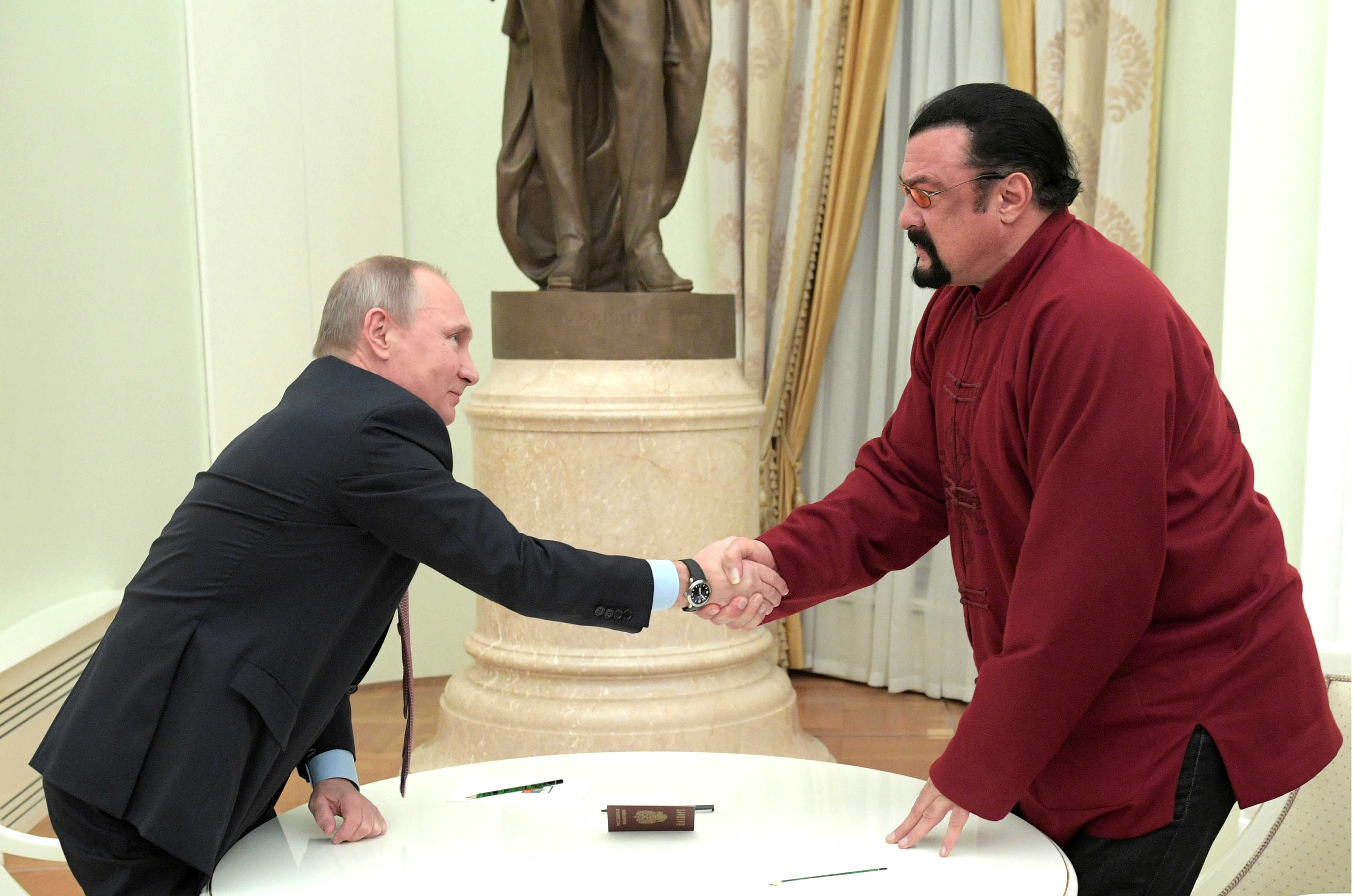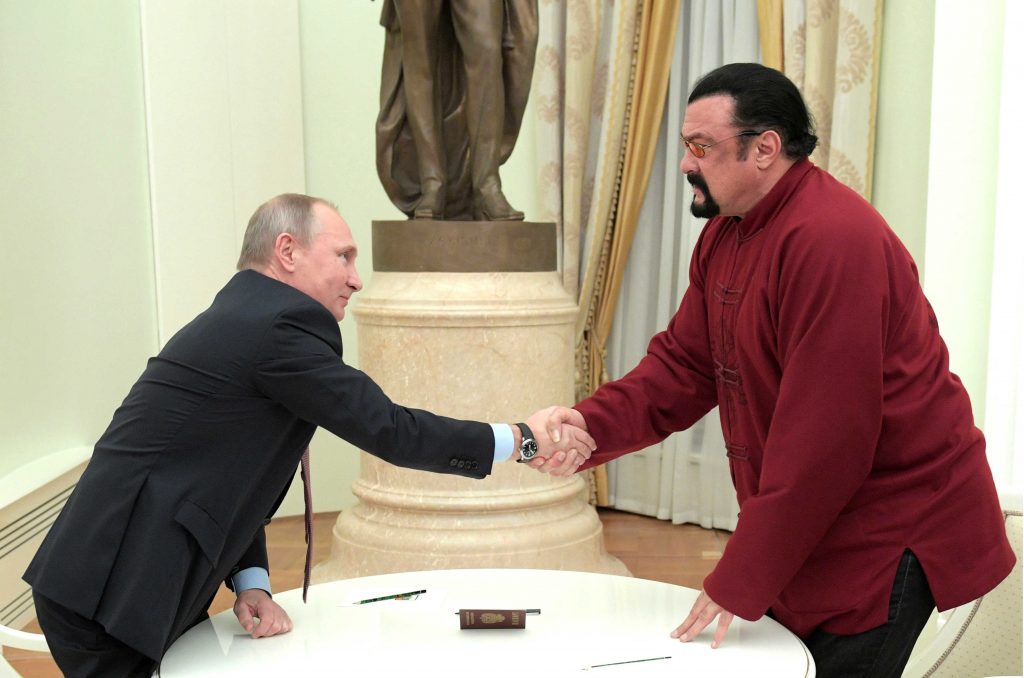 It seemed like the international affairs version of clickbait: the president of the world’s leading nuclear state awarding citizenship to a foreign actor most famous for playing an ex-commando who must rescue an exotic dancer while foiling a plot to start World War III on the high seas. For most onlookers, Vladimir Putin’s gift of a Russian passport to 1990s American action star Steven Seagal was just another in a long line of head-scratching public relations stunts involving semi-retired Western celebrities that have lent a circus-like quality to Russian power. But Putin is not in the habit of making fun of himself, nor is he a person to consciously do anything to invite ridicule. There is no reason to doubt the sincerity of his belief that his personal rapport with the star of films like Under Siege and Hard to Kill might be a “harbinger of…normalization of relations between our states.” For all the ongoing conflict in the international arena, the heartfelt nature of the overtures to Seagal and others reflects the little-appreciated reality that Russia remains deeply dependent on the West not only for economic sustenance, but also for emotional and psychological validation.
It seemed like the international affairs version of clickbait: the president of the world’s leading nuclear state awarding citizenship to a foreign actor most famous for playing an ex-commando who must rescue an exotic dancer while foiling a plot to start World War III on the high seas. For most onlookers, Vladimir Putin’s gift of a Russian passport to 1990s American action star Steven Seagal was just another in a long line of head-scratching public relations stunts involving semi-retired Western celebrities that have lent a circus-like quality to Russian power. But Putin is not in the habit of making fun of himself, nor is he a person to consciously do anything to invite ridicule. There is no reason to doubt the sincerity of his belief that his personal rapport with the star of films like Under Siege and Hard to Kill might be a “harbinger of…normalization of relations between our states.” For all the ongoing conflict in the international arena, the heartfelt nature of the overtures to Seagal and others reflects the little-appreciated reality that Russia remains deeply dependent on the West not only for economic sustenance, but also for emotional and psychological validation.
The segment of the Russian population bound most tightly to the West is, of course, the elites of Moscow and St. Petersburg, who have always determined the course of the country’s modern history. Following the fall of the Soviet Union, when Russia was wracked by gang warfare, separatism, and economic upheaval, many began relocating their children and fortunes to the West. Today, there is hardly a prominent family in Russia without one or more members living abroad, often permanently. To name but a few of the most famous examples, Putin’s First Deputy Prime Minister, Igor Shuvalov, regularly commutes to a home in Austria on his private jet, that is, when it isn’t ferrying his wife’s Corgi show dogs to competitions around Europe. Presidential spokesman Dmitry Peskov owns a $600,000 Swiss watch, has a glamorous daughter who spends most of her time instagramming from Paris, and took a honeymoon yacht cruise to Sardinia after marrying a reported American national. Gennady Timchenko, the former co-founder of the oil trading firm Gunvor, itself based in Switzerland and widely suspected to be the source of Putin’s personal wealth, is a Finnish citizen. Putin’s eldest daughter is believed to be married to a Dutchman, and his presumed girlfriend, Alina Kabaeva, was reported by Swiss state media to have given birth at a private hospital in southern Switzerland. For this globalized caste, the desire to be confirmed in their normality by Western dignitaries, even unusual ones like Seagal, is self-evident.
But the thirst for Western approval, however, is about more than showing off. In the modern world, the competing forces of nationalism and globalization have heightened both the stigma and the awareness of Russians’ periphery status. No less than the gilded classes of the “two capitals,” the Russian hinterlands seek to prove that modernity has not left them behind by lavishing attention on the trickle of pro-Russian Western VIPs. The more provincial the destination, the more over-the-top the greeting. Thus both Seagal and French actor Gérard Depardieu received a hero’s welcome in Chechnya, while Jeff Monson, an American mixed martial artist, received a gold watch and a passport, respectively, after meeting personally with the “heads of state” of Abkhazia and the Russian-backed Luhansk People’s Republic in eastern Ukraine. Even in moments of crisis, the veneer of Western-style propriety has to be maintained—when the so-called Luhansk and Donetsk People’s Republics held their self-styled parliamentary elections in late 2014, Russia made sure to assemble a team of international “election observers” from various European fringe parties, in conscious imitation of OSCE practice. Nor can animosity toward the West be sustained indefinitely. While just half of Russians favored improving relations with the West in mid-2015, that number has now rebounded to more than seventy percent.
Naturally, Russia is hardly the only country in the world to seek the West’s benediction and curse it in the same breath. But the tension between the need for external acceptance and the realization of internal shortcomings has been a constant of the Russian state since Peter the Great set the goal of catching up with Europe at the end of the seventeenth century. Even during the most repressive period of Stalinism, when non-Russian ethnicity alone was grounds for a death sentence, the Soviet authorities still cherished the visits of Western fellow travelers like H.G. Wells and Romain Rolland. Today, much of the strain in relations is attributable to Russia’s feeling that the West is withholding the praise that is its due, which is precisely why friendly words from a Seagal or a Monson are met with such gratitude. The larger problem—that Russia expects and demands applause for actions which can only draw international condemnation—is passed over in silence.
Andrew Kornbluth holds a PhD in history from the University of California, Berkeley.
Image: Russia's President Vladimir Putin (L) shakes hands with US actor Steven Seagal during a meeting at the Kremlin in Moscow, Russia, November 25, 2016. Sputnik/Kremlin/Alexei Druzhinin via REUTERS
